Nothing Chels matters: ‘The greatest thing football has given us is each other’
Last year, Chelsea Randall spent the entire season in the injury ward. Today, she will create history when she becomes the first sole captain to lead Adelaide in an AFLW game.
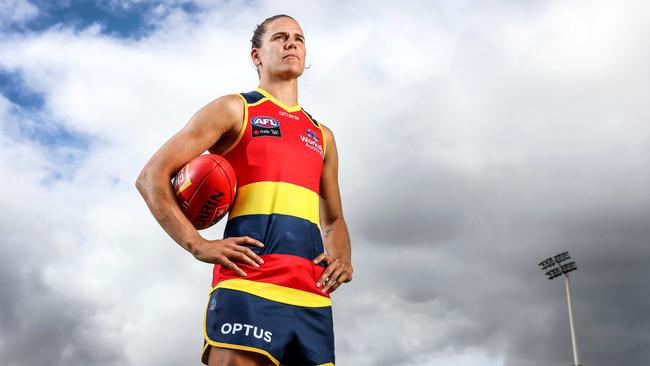
SA Weekend
Don't miss out on the headlines from SA Weekend. Followed categories will be added to My News.
The first time Bec Goddard, future inaugural AFLW coach of the Adelaide Football Club, laid eyes on footballer Chelsea Randall was in 2009. Goddard was umpiring an open women’s game between Western Australia and Victoria in Perth.
Randall might only have been 17, but was already acting captain of the WA side. She had played her first game of football when she was 11 for the Safety Bay Stingers, and despite being laughed at and ridiculed by the boys she faced, she continued to play. And flourish.
In this particular game in 2009, Goddard didn’t have much time to see what Randall was capable of, because not long after the opening bounce, disaster struck.
“I watched Chelsea come out of the goalsquare, try to take an absolute screamer, land awkwardly and she broke her ankle, a compound fracture in her leg to the point where her bone was pointing out and her foot was facing the wrong way,” Goddard recalls. “I thought to myself: ‘Well, we’ll never see that kid play again, because how are you going to recover from that?’.”
Randall needed eight screws and a plate to put her ankle back together again. She spent her 18th birthday in a wheelchair.
“That was the first game of the tournament and that’s what happened to her,” Goddard says.
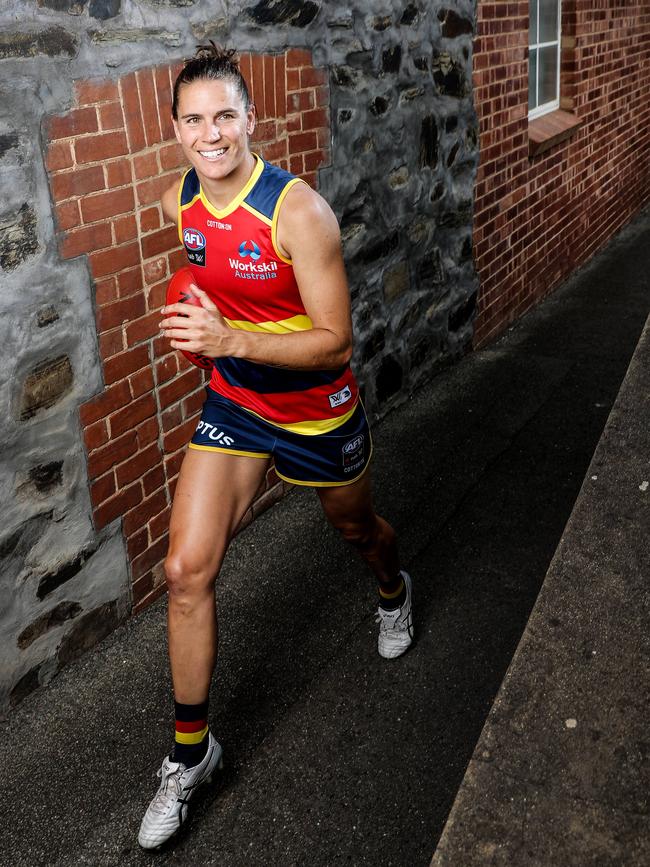
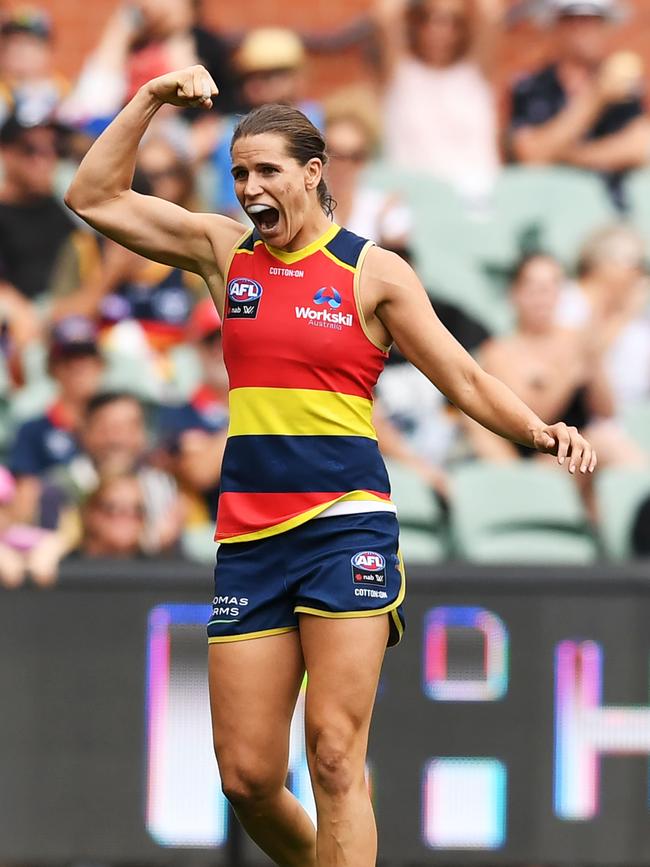
“But by the end of the week, she’d been named in the All-Australian team and I thought: ‘My God, that’s unusual, she didn’t even really play half a game and she’s been named All-Australian, she must be some kind of footballer’.”
The two would be reunited in 2016, when Canberran Goddard was appointed coach of the Crows and Randall was named her marquee signing. Finally, Goddard was able to see up close, exactly how much Randall was “some kind of footballer”.
Gallant. High leaping. Strong marking. Fierce at tackling. Brilliant spoiler of the ball who approaches the contest with uncompromised fearlessness. Three-time All-Australian defender. Three-time winner of AFL Player’s Association Most Courageous player award.
Now aged 29, the 173cm Randall has 23 AFLW games to her name, in which she’s averaged 15 touches, three marks, four tackles, two rebound-50s and two inside-50s per game.
But for Goddard, it’s what Randall brings off field that impresses her most.
“She’s got the statistics behind her in terms of the actual football, but to me and what I know of Chels, is that she’s got the courage to follow her heart,” Goddard says.
“And people can see that. She’s graceful under pressure in football and that literally is the definition of courage for me, but it’s also how she lives her life. She’s got the courage to follow her heart … she’s like Napoleon Bonaparte said of good leaders, ‘She’s a dealer in hope’.
“She infects everyone with her hope and her hope isn’t: ‘Oh, I hope we win today’. Her hope is: ‘I hope we can be a part of something great together’. And that brings everyone on side.”
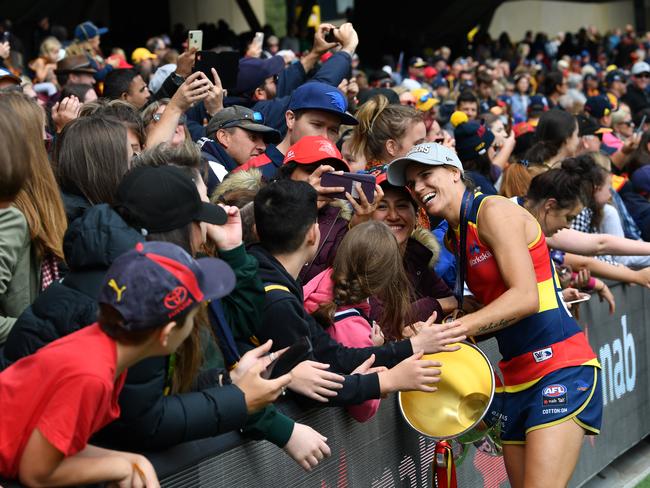
It must have been one of the most difficult social media posts Randall has ever written: informing teammates, family, friends, supporters and the broader footballing world, that she would miss the entire 2020 season after tearing her anterior cruciate ligament.
She wrecked her knee on the first day of pre-season training in a drill as the 2019 reigning premiers were looking towards the fourth season of the AFLW competition and becoming the first team in the history of the league to win back-to-back grand finals. Just as she did when she was 17 and badly broke her ankle, Randall was once again facing a long rehab.
It’s well documented that the road back from a knee reconstruction can be a rocky one; a mental battle as much as a physical one, sometimes lonely, often painful.
Randall’s experience rehabbing her reconstructed knee — slowly learning to run again then getting it to the point of competition — was no different.
“I definitely had moments that were challenging,” she muses. “There was a time, after COVID had hit, I was up to the running (a couple of months post-op) and I had about three weeks where my (negative) mindset was really hard to shake to get out of and I’m generally a pretty positive person.
“You take each day as it comes. It’s that old cliche in football, but it’s true. You wake up and you take the good and the bad and the biggest thing was just being kind to myself, that if I was feeling a bit flat I had to understand that I just had to show up and that’s about 80 per cent of your success, just to show up and try to get it done.
“Looking back, those hard days were actually the strength that I needed to get through, to know that I could do this no matter what.”
As she waited for surgery, she continued pre-season in any way she could, setting up a chair alongside the boundary line at the Crows’ West Lakes training ground and as her teammates went about their drills nearby, she put on a pair of boxing gloves and undertook a rigorous boxing workout with one of the trainers. Sitting down.
For the casual observers of Randall during the early days of her rehab, her commitment looked extraordinary. For those closest to her, that’s precisely what makes her one of the most respected athletes in the AFLW.
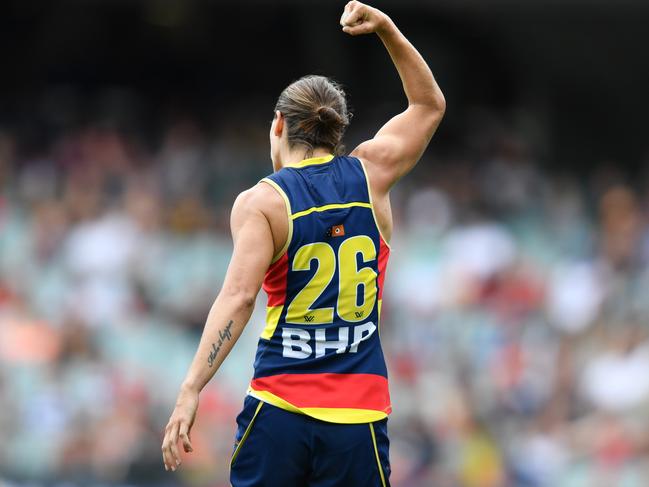
“During my rehab, I made sure I came in and did all my sessions early in the morning so I could be really present with the girls out on the training track,” Randall recalls. “I hated the thought of being in the gym by myself and everyone else out on the track and not being able to encourage or support.
“So my days looked slightly different where I would train by myself or with the physio or with (assistant) Warwick Raymond and then I’d go out and be with the team. I didn’t miss a session.”
The team’s 2020 season didn’t go to plan. As Randall watched from the sidelines, Adelaide won only two of six games before the COVID-19 global pandemic shut down the league with no premier declared.
After more than 650 days since her last AFLW game — the 2019 Grand Final played in front of a phenomenal 53,034 spectators on March 31 — Randall returned to the field having successfully overcome her devastating knee injury.
She played in the Crows’ pre-season trial game against Greater Western Sydney at Norwood Oval and seemed to be back to her usual self: jumping into packs, diving into tackles, leaping to take marks. The coaches were ecstatic, Randall herself thrilled.
Goddard is not shocked to learn of Randall’s return.
“It doesn’t surprise me because, like I said, I saw this 17-year-old kid break her leg horrendously — horrendous, like a traffic accident kind of injury that you would see — and the fact that she came back from that, shows the amount of resilience that she’s got.
“She’s not scared of anything; she is courageous with a heart.”
The day after Randall’s successful return to the game after tearing her ACL, she was unveiled as the side’s 2021 captain — the first woman to be stand-alone captain of the Adelaide Footy Club.
Randall had co-captained the team alongside prolific midfielder Erin Phillips for all four previous seasons of the AFLW competition, side-by-side holding the premiership cup aloft in 2017 and 2019.
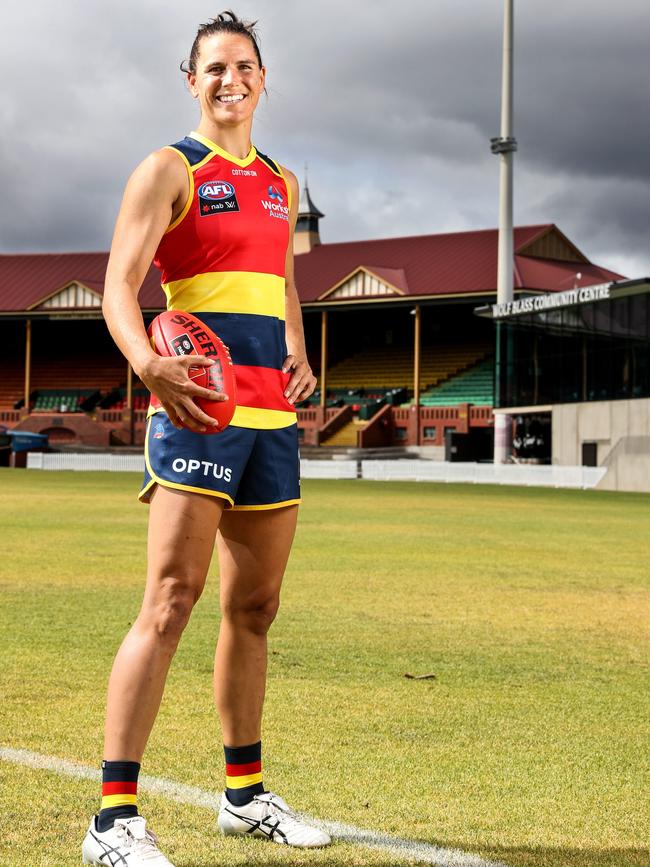
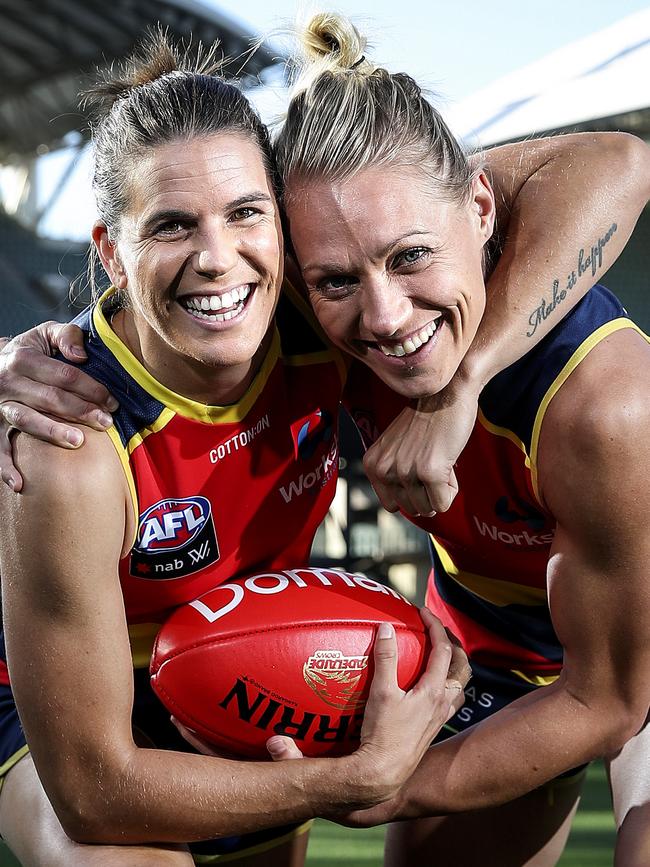
Both are heralded as stars of the competition. Earlier this month, the 35-year-old Phillips announced she was stepping down from the co-captaincy to take on a role mentoring the next generation of Crows leaders, having also made the leap into the world of breakfast radio with Mix102.3.
Before footy brought Randall and Phillips together, the two had never met, but they formed a strong bond away from the field as much as on it.
“When I joined the Crows I hadn’t met a lot of people here in Adelaide, coming from Western Australia, so I was getting to meet new faces and Erin was one of them,” Randall says.
“I think Erin and I had a really unique bond where we really complemented one another; we joked about getting a yin yang tattoo on us after the 2019 grand final, because it was such a unique relationship, where she really brought out the best in me and I hope that I brought out the best in her and for our playing group.”
Goddard says the two best friends were perfect co-captains for the side.
“Chels and Erin really balanced each other out, which meant they were both able to perform at their best, not one of them had the sole responsibility of leading a brand new group of rookies, essentially, through to that inaugural premiership,” she says.
“It’s why I wanted dual captains, because I didn’t want them to feel that pressure and have to do it on their own. But they balance each other out in the areas where the other is strong … they were great like that.”
But Goddard, now head coach of Hawthorn’s VFLW side, says Randall will be an exceptional leader in her own right.
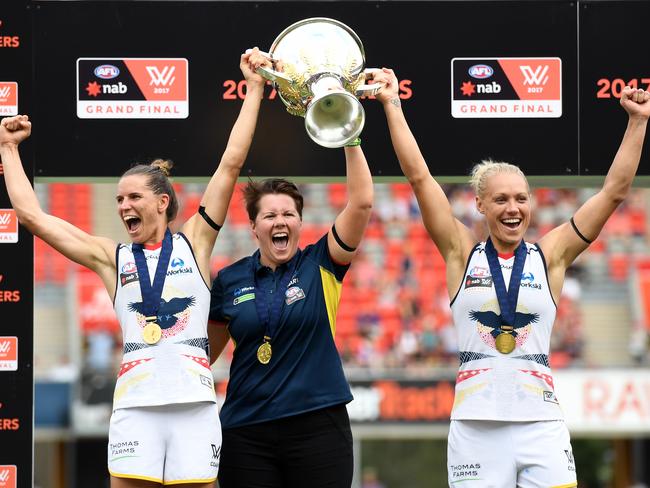
“Erin will always lead, it doesn’t matter if she has the title or not, but the great thing about Chels and her leadership is that she is so collaborative … she brings everyone in on discussions of how to be great,” she says.
“And that’s why I think she’ll be a great leader on her own; she’s just really collaborative, it’s never my way or the highway.”
It’s somewhat bemusing that when you ask Goddard for insights into Randall, she details the injuries of the star player. But in many ways the injuries paint a picture of the person, more than the player. Well, not the injuries themselves, but how she overcomes them.
For Goddard, there’s not just the broken ankle, or the torn ACL, there’s another injury she recalls Randall having to overcome during her time in charge of the Crows (which ended in 2018 after two seasons when she returned to her full-time role at the Australian Federal Police in Canberra).
“Coming back into Season Two (in early 2018), before we were due back at training after our Christmas break, she sent me this text saying: ‘Oh, I’ve had a bit of an accident … I don’t want you to worry too much’. And she sent me this photo. She’d had jumped off a river bank and had sliced the back of her heel open,” Goddard says, adding that Randall had been on a trip with friends.
“She missed her Achilles by literally a millimetre and when she came back to training she couldn’t run because every time she even walked, the wound would open and the poor thing, she was really frustrated with herself, but again, carefully rehabbed herself and set an example on how to rehab.
“But that shows her adventurous spirit … and her desire to always have a good time with the people who matter to her most.”
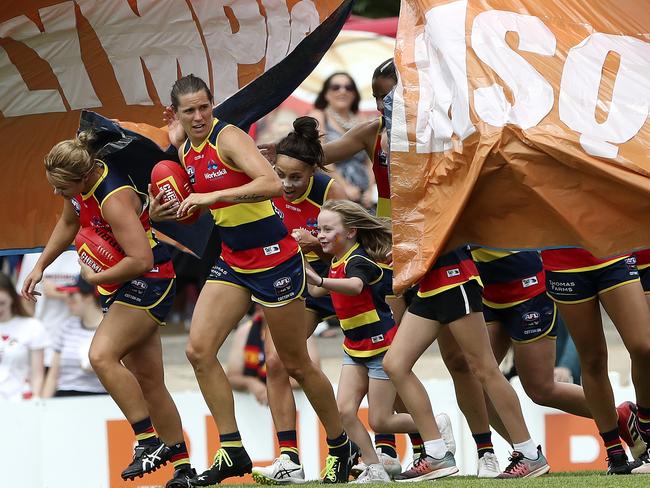
Ask Randall what football means to her and she can’t find the words. But you get the sense that if she was some kind of large puzzle, then football has given her hundreds of tiny pieces that have connected together to help make her the whole person she is today.
When she was 25, Randall had been working as a regional manager in the remote East Pilbara town of Newman some 1200km north of Perth, when then Crows football boss David Noble (who is now the newly appointed coach of North Melbourne), made the long journey to visit her there, making the case for why she should sign with Adelaide.
She said yes, mainly because South Australia at the time was not known as a stronghold in women’s footy, and Randall saw an opportunity to make a difference in women’s sport.
“I actually chose (the Crows) because it had the weakest football talent and I felt that I could have a positive impact not just at the footy club, but in the state,” she once explained.
Today, she is an Elite Female Talent Officer for the Crows, helping the next generation of women footballers (however, COVID’s impact has meant she is still stood down from that role and is working casually at Beau’s Pet Hotel close to the airport as an animal attendant).
Football is only a part of the whole Randall, however. She is an avid animal lover and has two dogs, Koda and puppy Lenny.
She loves camping, playing the guitar and is studying a teaching degree through UniSA, which she has been chipping away at for eight years and should be finished by the end of 2023 (“I think my 40-year-old self will thank me once my footy career’s done and I’ll have a degree behind me, so I’ll keep chipping away”).
In 2019 she gave up a lucrative offer to return home to WA to play with AFLW expansion club West Coast — the team she grew up supporting — to say at Adelaide.
Randall often refers to her teammates as her “Crows family”, and is thankful to those who have helped make up for the fact that she lives in a different state from her actual family members, including nieces and nephews.
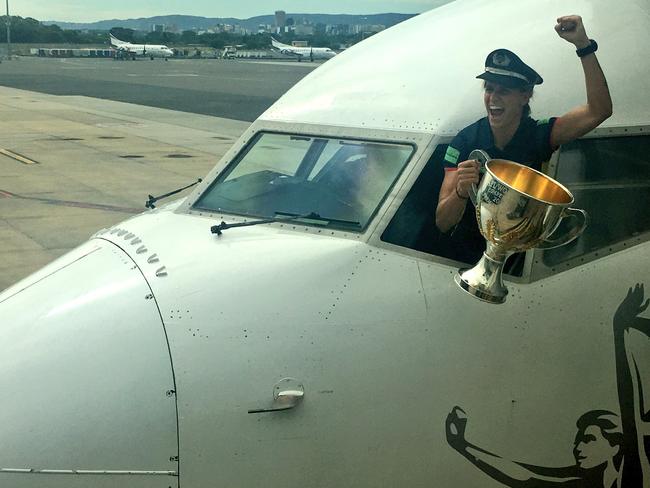
So when she pulled her teammates into their pre-game team huddle for her first address as stand-alone captain on January 17, it’s fitting she said to them that the best thing footy had given them was each other.
These words would come as no surprise to Goddard: “After I finished coaching at the Crows and I moved back to Canberra, it was my 40th birthday a couple of months later and Chelsea and a small group of the girls travelled across the countryside, they took two planes to surprise me, and turned up in Canberra for my 40th birthday.
“I got to spend a great weekend, a great night with them and I have a photo of the two of us from that night. It was just really special that she would do that for me, to make me feel special. That’s the kind of person she is.
“It’s one of my favourite memories of her, it’s not football related, and it always makes me smile.”
Randall will line up for the Crows in their Round 1 game against West Coast in Perth this afternoon and she is heading into the game — her first official AFLW match since the historic 2019 Grand Final win — with nervous excitement.
“I feel like I’m playing Round 1 back in 2017, again, I feel like it’s my second chance at playing AFLW in a sense, so I feel good and I’m excited,” she says.
“I don’t know if I quite have the words yet to describe truly how grateful I am for the opportunity to play at the highest level. It really is something hard to put into words because it has meant so much to me and it’s meant so much, too, to so many players across the nation.”
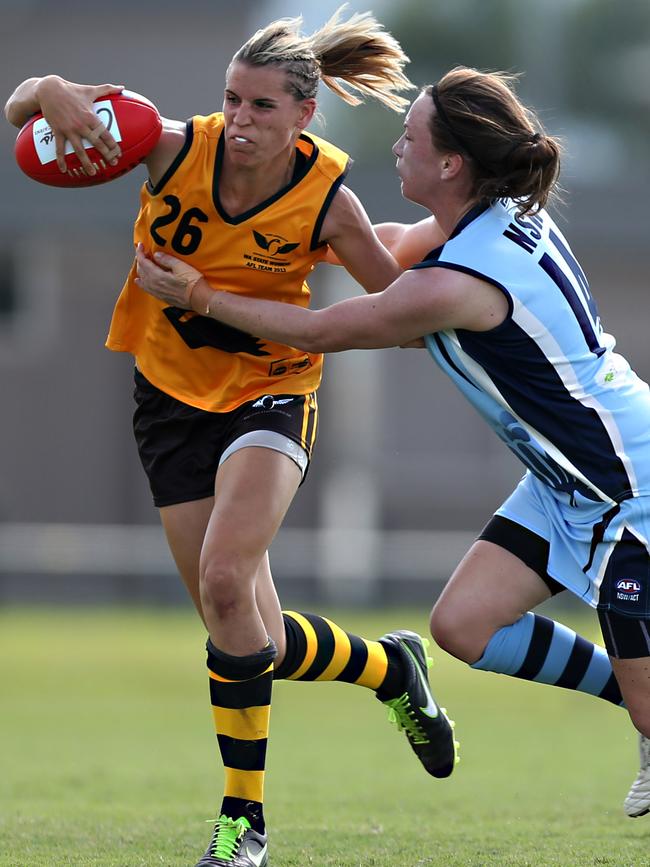
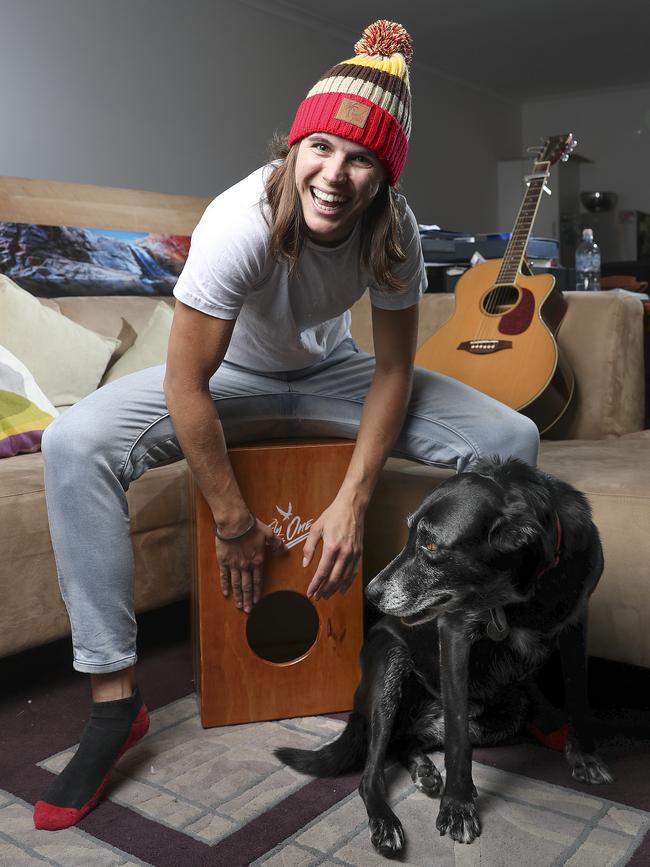
As for her ACL injury, Randall is looking forward to putting it all behind her, while also understanding that perhaps there will be elements of that injury that she’ll always carry with her.
“COVID allowed me some extra time to do my rehab … that’s what 2020 gave me, time to reflect and I know that footy is where I want to be and (the injury) helped, I guess, to make me realise that things can be taken away from you just like that. So it’s pretty exciting to be back on the track with my mates, my little Crows family and I’m pretty excited to play with them.
“I don’t know if (the injury) changed me, but it made me realise other skills that I have that I didn’t necessarily know beforehand — and even just, I think, it has made me stronger mentally in terms of building resilience. And when things do go wrong or don’t go your way, there are always different strategies you can use to get yourself out of that.”
Randall acknowledges the importance of the 2021 season given the 2020 season was ended prematurely as COVID wreaked its havoc on the sports industry. Also because, for the first time in AFLW history, the competition is charging for tickets ($10 for adults, kids under 18 are free).
“It’s a really important year for (the competition), because there are challenges that many teams and many players individually have to go through to make this season work,” Randall says.
“That’s why it’s so important for fans and members and football clubs and even families to support the players; even their bosses and the organisations they work for, it’s so important they support these players to be able to do what they love and in return, it gives the community the entertainment.
“But also it helps young people, and young girls in particular, when they’re seeing their role models playing footy knowing that (women footballers) have a place in society that’s highly valued.”


